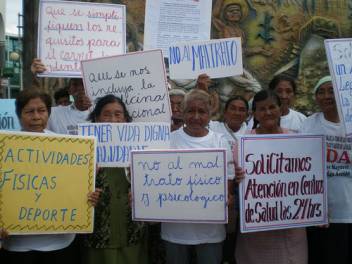 If I had to put into three words what the last seven years of the Age Demands Action (ADA) campaign has meant to me I would say participation, leadership and raising awareness. It’s these characteristics that have led to the campaign’s continued expansion and success.
If I had to put into three words what the last seven years of the Age Demands Action (ADA) campaign has meant to me I would say participation, leadership and raising awareness. It’s these characteristics that have led to the campaign’s continued expansion and success.
Participation
ADA began in Latin America in 2007 with five organisations. Grassroots support for the campaign starting to gain momentum and in 2010 the campaign took a giant leap when the number of countries increased to nine. And at the last count, there were 12 countries involved: Argentina, Bolivia, Colombia, Costa Rica, Chile, Ecuador, Haiti, Nicaragua, Panama, Paraguay, Peru and Dominican Republic.
As regional campaign coordinator, I have witnessed the growing motivation of the organisations that take part. Their actions have galvanised countless older people in communities everywhere and have had a ripple effect over 12 countries.
Over 35 organisations in 12 countries took part last year, with a similar number of organisations involved this time. We have collected thousands of signatures in support of a new UN convention on the rights of older people and achieved important agreements with government authorities both at local and national level.
At the national level, older people have lobbied for a variety of issues, such as universal social pension schemes, better access to health services, age-friendly cities and social protection legislation. This year, older people’s campaigning led to the successful lobbying of governments to support a new UN convention on the rights of older people.
At the regional level there were also many successes. An example is the last session of the UN Open-ended Working Group on Ageing in August, a group which focuses on promoting the issue of older people’s rights in Latin American countries. We collected many signatures for the ADA petition in support of a convention.
Raising awareness
Throughout the ADA campaign, awareness on the subject of ageing reached more and more people. In 2010 we received 40 media hits, while today that number has increased five times to over 200. While the press coverage has been growing since 2007, what is most encouraging is that the media has changed how it looks at older people.
We have seen a shift from negative terms used in mass media to terms such as “golden age”. This shows that a change in attitudes towards older people and old age is starting to happen and that people recognise older people’s contributions and rights. This change of attitude is fundamental to face the challenges of a rapidly ageing world.
Leadership
During all these years of ADA activism some of our demands have been met, yet there is still much to do. However, one of the most remarkable achievements of ADA is that it is a vehicle for older people to become leaders. Some members of our network that we are very grateful to are Teobaldo Cavadía, Roberto Chamucero, Edilia Camargo, Carlos Loza, Miguel Romero, Rosa Azua, Ramon Aguilar, and there are many others.
All our leaders represent and amplify the voices of hundreds of thousands of older women and men to make real changes in their societies. They are the real agents of change, active frontrunners in promoting the rights of older people.
In short, the ADA campaign in Latin America has shown that older people can be real leaders who can call on their governments for better treatment in their old age. The impact of their work will not only be felt by them directly but also by future generations of older people who will, by 2050, make up 25% of the Latin American population.
Get involved!
- Sign the ADA petition to support older people’s rights.
- Join our “C” for convention global photo action in support of a new UN convention on older people’s rights.
